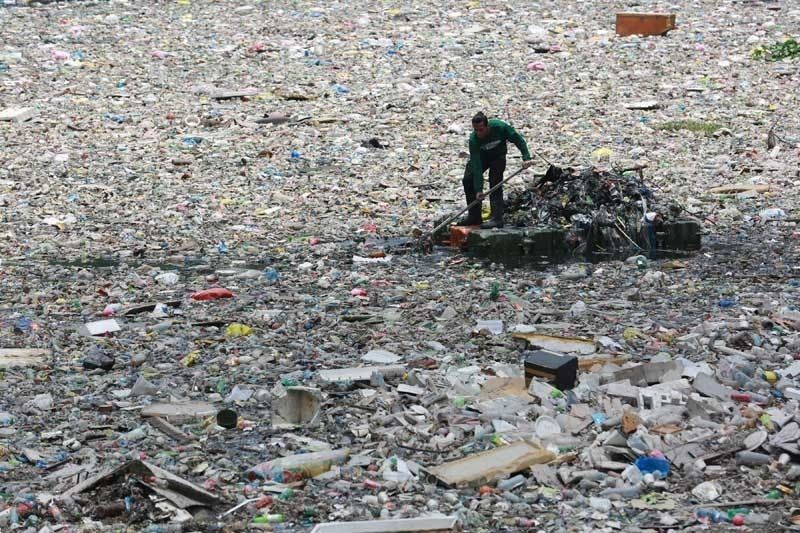Pandemic worsening plastic pollution — climate body

MANILA, Philippines — The Climate Change Commission (CCC) yesterday warned against a surge in plastic pollution due to the increased consumption of single-use masks, latex gloves and other personal protective equipment (PPE) during the coronavirus disease pandemic.
The CCC called for proper waste management and disposal, especially of plastic products that may end up in oceans and exacerbate the current plastic problem.
“As COVID-19 restricted public mobility, online shopping and food delivery services, often using single-use plastics, have further encumbered our waste management system,” said the climate body.
It also noted an increase in production and consumption of alcohol, hand sanitizer and other cleaning agents that are often packaged in plastic bottles.
The CCC expressed support for the recent administrative order issued by the Department of Environment and Natural Resources, which provides for the proper management and disposal of used masks, PPEs and other hazardous waste from hospitals, barangay health centers and clinics.
The commission also stressed the importance of fully implementing the Ecological Solid Waste Management Act of 2000, which provides guidance on proper segregation, transportation, storage, transfer, processing, treatment and disposal of solid waste such as plastics.
It called on local government units to help address the plastic pollution generated during the ongoing global health crisis, and encouraged the public to contribute to reducing plastic waste.
The CCC advised individuals to refuse disposable plastic cutlery when having food delivered, as well as support businesses offering more sustainable delivery packaging such as cardboard or compostable bags.
“The biggest challenge in adopting a more sustainable lifestyle is breaking old habits and making sacrifices for the climate and environment,” it said.
“But by slowly incorporating sustainable practices into our everyday activities, we would be able to protect both the health of the people, natural systems and the planet,” added the climate body.
Spawns diseases
A new United Nations biodiversity report warned that the continued degradation of the environment is increasing the likelihood of devastating diseases spreading from animals to humans, like the coronavirus.
The fifth edition of the UN’s Global Biodiversity Outlook report, published by the Convention of Biological Diversity (CBD), provides an authoritative overview of the state of nature worldwide and highlights the links between “unprecedented biodiversity loss” and the spread of disease.
The report notes the importance of biodiversity in addressing climate change and long-term food security, and concludes that action to protect biodiversity is essential to prevent future pandemics.
“As nature degrades,” said Elizabeth Mrema, executive director of the Convention on Biological Diversity, “new opportunities emerge for the spread to humans and animals of devastating diseases like this year’s coronavirus. The window of time available is short, but the pandemic has also demonstrated that transformative changes are possible when they must be made.”
The study acts as a wake-up call and an encouragement to consider the dangers involved in mankind’s current relationship with nature: continued biodiversity loss and the ongoing degradation of ecosystems are having profound consequences on human well-being and survival.
This year’s study is considered particularly significant because it serves as a “final report card” for the Aichi Biodiversity Targets, a series of 20 objectives set out in 2010, at the beginning of the UN’s Decade on Biodiversity, most of which were supposed to be reached by yearend.
However, none of the targets which concern the safeguarding of ecosystems and the promotion of sustainability have been fully met, and only six are deemed to have been “partially achieved.”
“Earth’s living systems as a whole are being compromised,” Mrema said, “and the more humanity exploits nature in unsustainable ways and undermines its contributions to people, the more we undermine our own well-being, security and prosperity.”
Although the lack of success in meeting the targets is a cause for concern, the authors of the Outlook are at pains to stress that virtually all countries are now taking some steps to protect biodiversity, without which the state of the world’s biodiversity would be considerably worse.
The bright spots include falling rates of deforestation, the eradication of invasive alien species from more islands and raised awareness of biodiversity and its overall importance.
However, the encouraging progress can’t mask the fact that the natural world is suffering badly, and the situation is getting worse. Financing is a case in point as funding for actions linked to biodiversity has been estimated at between $78-$91 billion per year, way below the hundreds of billions needed.
The figure is dwarfed by the amount of money spent on activities that are harmful to biodiversity, including some $500 billion for fossil fuels and other subsidies that cause environmental degradation.
Contained within the report are several recommendations, or “transitions,” which map out a scenario for a world in which “business as usual” is halted and environmental devastation is reversed.
Under the proposals, ecosystems would be restored and conserved; food systems would be redesigned to enhance productivity, whilst minimizing their negative effects and the oceans would be managed sustainably.
The design of cities also comes under the spotlight, with calls for a reduced environmental footprint in urban areas and “green infrastructure” making space for nature within built landscapes.
The report amplifies the UN’s support for nature-based solutions, hailed as one of the most effective ways of combatting climate change. Alongside a rapid phase-out of fossil fuel use, they can provide positive benefits for biodiversity and other sustainability goals. – Pia Lee-Brago
- Latest
- Trending



























